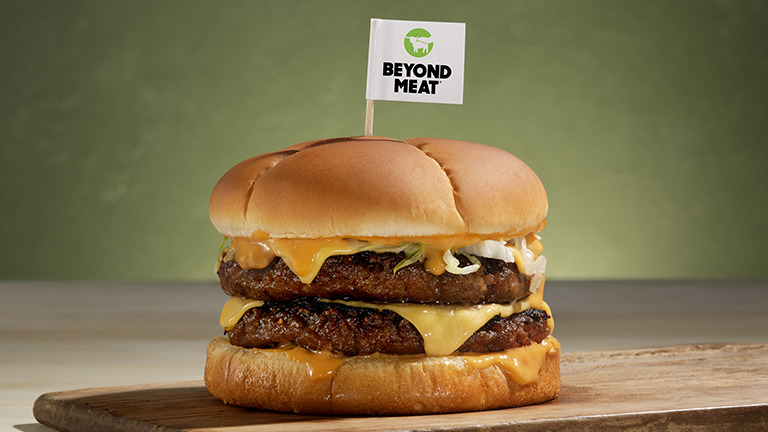Beyond Meat shares made a slight recovery Monday to $32.03 after falling to $31.99 on news McDonald’s may ditch its McPlant burger amid tepid results.
That begs the question: What’s next for Beyond Meat, as it struggles to keep pace with competitors like Impossible Foods? One industry expert suggested Beyond needs to create more creative offerings.
Mark Haas, CEO of The Helmsman Group, told The Food Institute. “Consumers who are adopting a plant-based diet, whether a Meatless Monday or something more substantial, are growing a bit fatigued of meat analogs in limited forms.
“It’s now time for the introduction of more sophisticated plant forward options that celebrate the goodness of plants.”
THE McPLANT MISFIRES
McDonald’s began testing a Beyond Meat patty in eight U.S. restaurants in November and then expanded to 600 locations in mid-February. The results, however, were lackluster and McDonald’s could decide against expanding the experiment nationwide, J.P. Morgan analyst Ken Goldman said in a recent note.
CNBC quoted (July 29) Goldman as saying Beyond would be hard pressed to meet its growth goals this year and next without McDonald’s. Second quarter results are due Thursday.
Beyond’s stock has lost more than half its value this year as not only restaurant forays have proved disappointing, but grocery sales also have slid.
“Many consumers are seeking options besides beef patties and crumbles,” Haas said.
BTIG analysts Peter Saleh and Ben Parente speculated McPlant’s lackluster sales may have been the result of pricing, The Street reported (July 30). They also suggested greater emphasis should have been placed on the meat replacement’s health and climate benefits.
Another obstacle to McPlant’s success could be the profile of the typical McDonald’s customer, experts told The Food Institute.
“I believe that Beyond Meat didn’t or refused to accept research about the average McDonald’s consumer before placing its product into the restaurant chain,” professional food writer Jessica Formicola said. “Many studies have shown that the average vegan or vegetarian consumer has a higher socioeconomic standing and also rarely consumes any food at a fast-food establishment compared to the average McDonalds consumer.”
Another problem may be generational. A SurveyMonkey poll indicated Gen Zers – in what used to be the key fast-food age group – are more focused on healthier eating than their elders.
A CLOSER EXAMINATION OF BEYOND’S STOCK
Beyond Meat’s 2019 IPO was among the most successful of that year, but within 18 months, the buzz began petering out.
Today’s Beyond Meat share price is 90% below its July 2019 peak. The Grocer reported investors apparently neglected to consider that it takes decades to change consumers’ eating habits, treating Beyond Meat more like a tech company than a food company.
“I don’t think investors appreciated those differences, particularly when you saw the rapid growth of Beyond Meat when it secured quick-service restaurant listings in the U.S.,” Morten Toft Bech, founder of Meatless Farm, told The Grocer, which also indicated early growth was too reliant on the novelty of the company’s products.
Haas, a food and beverage innovation expert, said though meat analogs are here to stay, “these iconic plant-based powerhouses may be plateauing for a time as fast-food sales are likely to dip in response to global pricing pressures and the inability to maintain price premiums for co-brand offerings.
“Overall,” he added, “I predict total global volume of sales in meat analogs to continue to grow, led by the fast-casual operators but maybe with a private label option instead. Retail will become competitive with discount offerings and more sophisticated flavor options that are beyond meat analogs.”












